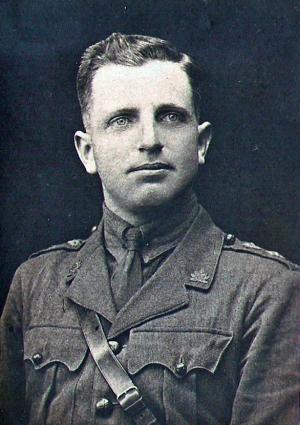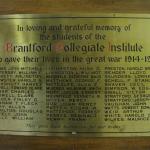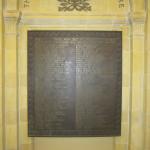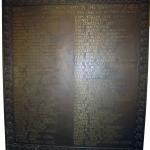Circumstances of Casualty: Died of Wounds in the Field, Belgium.
Location of Unit at Time of Casualty: Attack South of Passchendaele.
BX November 13, 1917
Lieutenant Alva Elmer Metcalfe Died of Wounds
Lieutenant Alva Elmer Metcalfe is reported to have died of wounds. He won the Military Cross and rose from the ranks having enlisted as a private at Edmonton. He won the promotion on the field. Mrs. T.E. Paterson, 34 Ontario Street, is a sister.
Calgary Herald December 22, 1917
Letters Tell of Brave Death of Lieutenant Alva E. Metcalfe – Former Alberta Officer Killed in Performance of Duty at the Front
Killed by a bomb dropped from a German aeroplane while he slept, was the fate of Lieut. Alva Elmer Metcalfe the gallant young Alberta officer who won the Military Cross for crossing 300 yards of open ground in broad daylight during the fighting at the Somme. He went overseas as a private and won his commission and decoration on the field.
He was reported killed in action over a month ago, and the commanding officer of the unit with which he was serving, and also the chaplain have written to his sister, Mrs. T.E. Patterson of Brantford, Ontario. Lieut. Metcalfe was a student at the University of Alberta in Edmonton and also attended the Normal school in Calgary. Lieut. McNally, mentioned in the chaplain’s letter, was a chum of the deceased when they attended the university.
The Letters
The following are the letters received from the officers:
November 16, 1917
In the field, France
Dear Mrs. Patterson,
It is with sincere sorrow that I write to confirm the announcement which you doubtless received some days ago informing you of the death of your brother, Lieut. A.E. Metcalfe, who was killed in action on Nov. 8, 1917.
He had been in the line with the attack and when all the officers in one company became casualties he had voluntarily taken on the duties and maintained his position and that of the company, in the face of heavy shelling. This was on Nov. 6 and on the night of Nov. 7-8 the battalion came out of the front line and were in camp in the forward areas. During the night of Nov. 7-8 enemy aircraft came over and dropped bombs on our camp, and one fell close beside the tent in which your brother was resting, and he was instantly killed.
He was in every respect a fine young man and an excellent officer and soldier.
His brother officers and men under his command, indeed the entire battalion, feel deeply his loss and extend heartfelt sympathy to yourself and any other members of the family.
It may help you to bear our sorrow less acutely to know that he conscientiously performed his duties that his work was highly appreciated and that he died a hero’s death.
He received a proper burial and his last resting place is marked and registered, but you will doubtless receive notice as to this through the regular official channels.
Believe me, yours most sincerely,
C.D. McPherson,
Commanding, Alberta Battalion
From His Chaplain
Dear Madam,
You will have received official information before you receive this letter of the death of your brother, Lieut. A.E. Metcalfe.
I write to express my sympathies and those of all the officers and men of this battalion. We deeply regret his loss. He was killed instantly about 4 a.m., Thursday the 8th of this month.
A German aeroplane flew over our lines and dropped bombs, one dropped very close to the tent where your brother and two other officers were sleeping. Two were killed, the third escaped. Your brother was killed instantly and would suffer no pain. We all were very fond of him, and it is a great grief to us. He and I and another officer shared a room for nearly all the month of September and we got to know each other very well indeed, and had a lovely time together.
Now I am about to return to Canada to take charge of New St. Paul’s parish, Woodstock, Ont. Your brother knew of this and came to talk to me about it several times. He did not want me to go into the last battle for fear that I might get killed or wounded, and he made me promise to go to Brantford and see you at the first opportunity. He seemed to insist that I should do so, and a day or so before he was killed he wrote out your address on a piece of paper and a reminder of my promise. I enclose the slip to you.
I buried the remains in Menin Square Cemetery and have arranged to have a wooden cross erected. In conjunction with Pte. McNally, a brother of the other officer who was killed, bearing his name, rank and date of death. I shall try to secure a photograph of the grave if you so desire. May God bless him and give him eternal rest for our Savior’s sake. He has given his life in the cause of righteousness and the right of the world to live at liberty and in peace. I shall redeem my promise as early as possible.
Yours very sincerely,
Edward Appleyard, Chaplain




